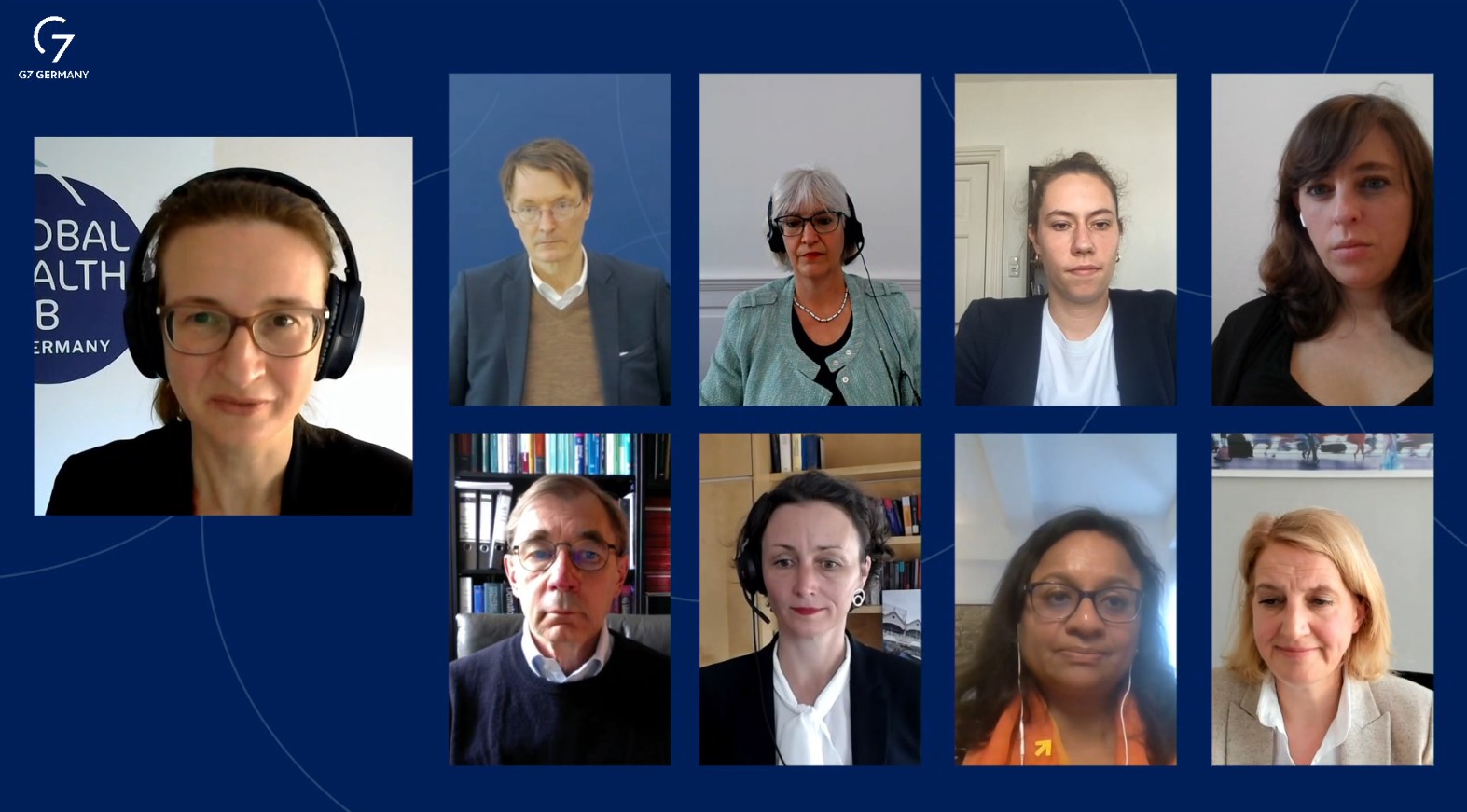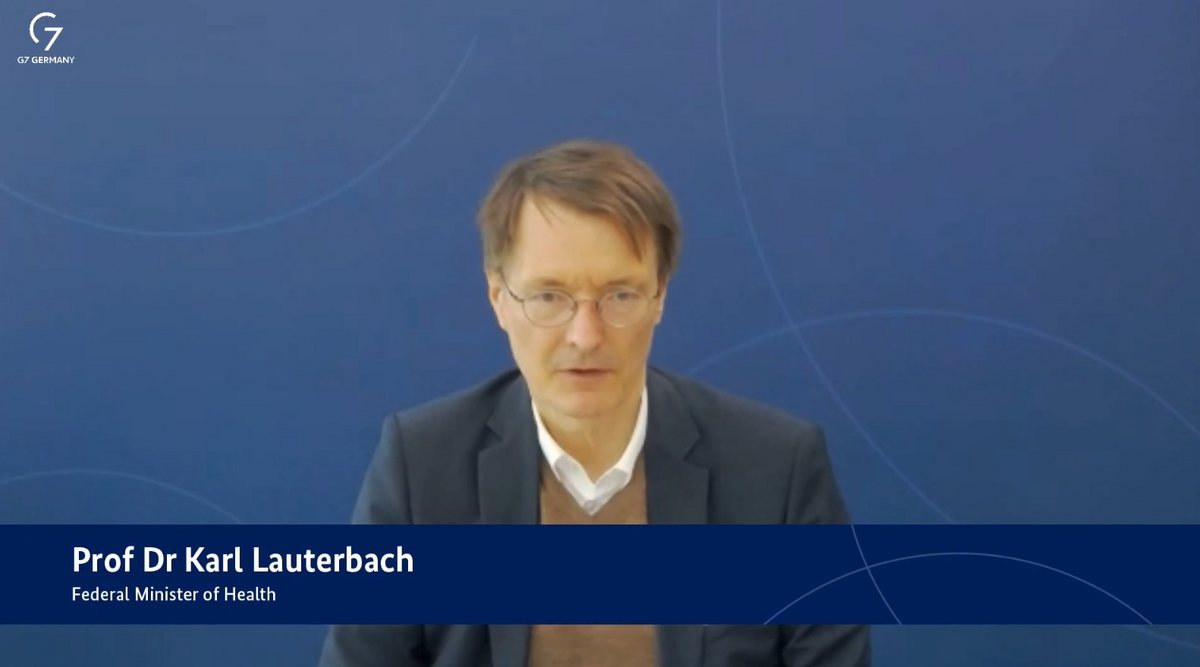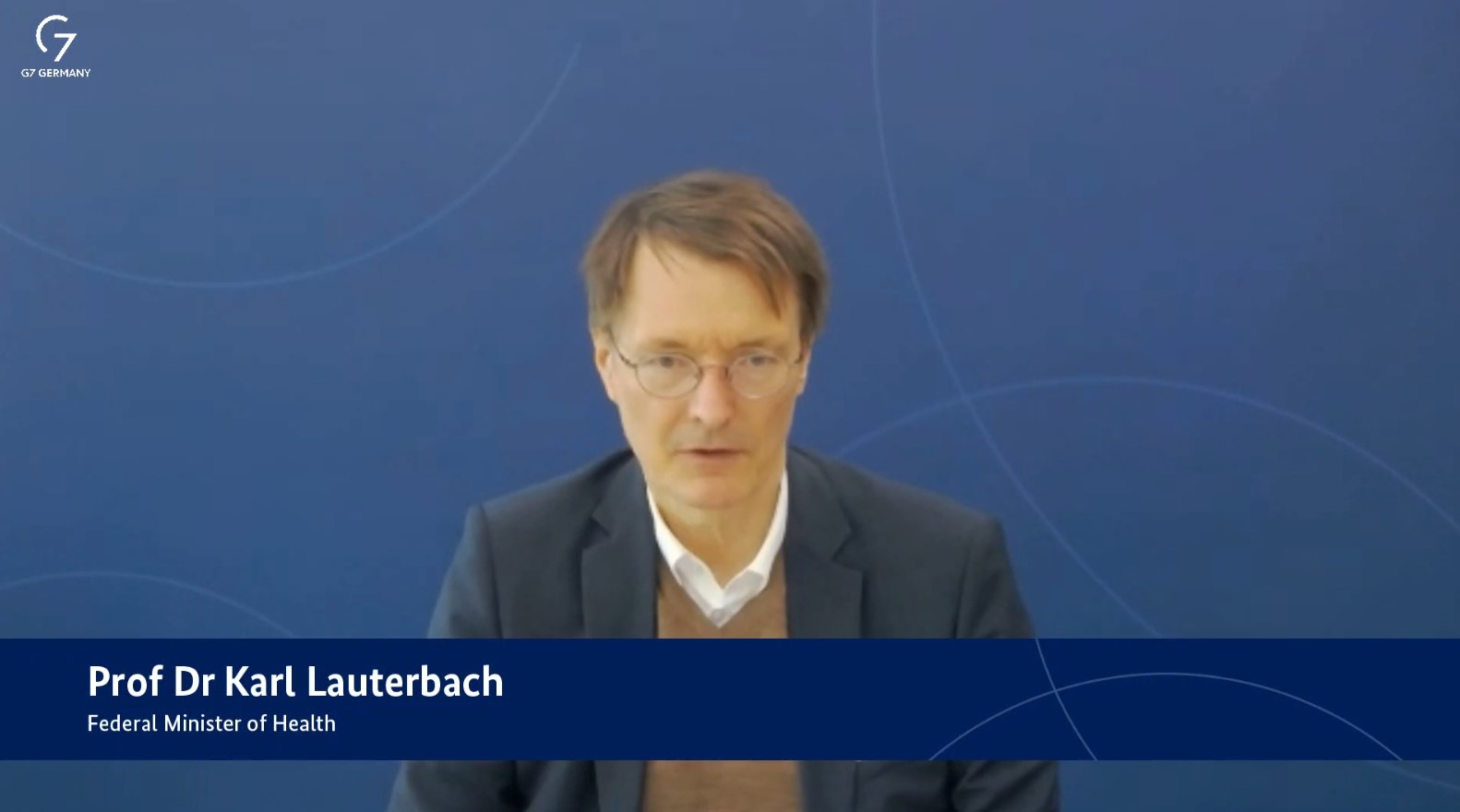Recap: Discussing the Future of Global Health And the Role of the G7

Federal Minister of Health Karl Lauterbach discussed the Global Health priorities within Germany’s G7 Presidency with representatives of the G7 Engagement Groups.
How can the G7 end the coronavirus pandemic and be prepared for the next health crises? What about their commitments to strengthen health systems, following the One Health approach and transform the global health architecture? How can the impacts of climate change on health be taken into consideration? In the lead up to the G7 Health Ministers’ meeting in Berlin on 19 and 20 May, the Federal Ministry of Health invited the G7 engagement groups to share their views on the German presidency programme. The G7 engagement groups came up with comprehensive recommendations communicated via an open dialogue with Federal Minister of Health Prof Dr Karl Lauterbach. The results of this exchange will form the basis for further discussions with the G7 colleagues. The online event, moderated by Executive Director of the Global Health Hub Germany, Kristina Knispel, took place on 27 April 2022. Participants from over 26 countries registered to the event.
Civil Society underlines the need for a strong global health architecture
Angela Bähr, representative for Civil Society 7, focussed on the need for transformation of the global health architecture to address today’s public health threats. Civil Society strongly advised the G7 to support the proposed TRIPS Waiver. Moreover, complete technology transfers to low- and middle-income countries have to be insured to increase local production. Bähr points out: “Pandemic preparedness and response needs a strong global health architecture which takes diversity of people into account. It demands a fundamental political and financial strengthening of WHO’s independent and coordinating role.” The C7 engagement group advised the G7 to increase resources for ACT-A. Bähr said: “Future pandemics have to be prevented by ending today’s pandemics like tuberculosis, HIV/AIDS, malaria or AMR. Especially poor regions that lack good health infrastructure are in the centre of the climate crises. We need to scale up investments in community based primary health care and in strengthening universal health care.”
Youth 7: a holistic view on mental health is needed
Mental health of children and youth has been severely affected by the pandemic. Carolina Claus, representative for Youth 7, points out that in the G7 presidency programme mental health is only indirectly addressed within the framework of health at the workplace. People are only considered as employee and not as individuals. Mental health is also not addressed in the section of healthy lives, she underlines. Claus shares the vision of her engagement group: “We ask G7 leaders to add the topic mental health in the area of healthy lives, to apply a holistic view on mental health – not only addressing adults and to strengthen formal and non-formal educational institutions within the framework of mental health.”
Health needs to be recognised as a public good
The Labour 7 engagement group would like to see the G7 fundamentally question the current concept and recognise health as a public good. The health care sector should not aim at generating profit but providing good health care services. Carolin Vollmann, representative of L7 said: “We should have strong organisational health and safety regulations in place. G7 health ministers need to recognise that workers should not have to decide whether to stay healthy or to earn money. The management of the pandemic on an international level needs to be improved, the G7 need to continue supporting the COVID-19 Vaccines Global Access Initiative (COVAX) but also look at a more long term view on how public research could also benefit to broader global community.”
The One Health approach is crucial
The representative of Science 7, Prof Dr Thomas Krieg, focussed on the following major topics that were also underlined by minister Lauterbach: the urgent need to reduce carbon dioxide emissions, to control zoonotic diseases and to fight AMR. According to Science 7 there is an urgent need for an integrated approach – the so-called One Health approach, which brings together different disciplines in order to understand the complex interaction between health and ecosystems. Krieg said: “We ask the G7 to increase the preparedness for the next viral pandemic, to strengthen the discovery and development of antimicrobial drugs, building adequate infrastructures and promoting the international coordination in order to support human health in the future.”
Think 7 recommends 7 ideas for global health
Think 7 pointed out that strengthening multilateral health governance is crucial. Prof Dr Anna-Katharina Hornidge said: “We hope for substantial leadership from G7 countries to increase contributions to 50 per cent of WHO financing by 2028, ACT-A and COVAX should be supported, and we suggest the introduction of a new ministerial level priority infrastructure task force.” Think 7 also pointed out that the fragmentation of the global health infrastructure should actively be reduced through the introduction of an interagency standing committee for global health. Enhancing transregional dialogue in order to achieve health targets with a dialogue series from G7 to G20 and beyond is another idea of the Think 7 that also asked to strengthen surveillance systems and to introduce a planetary health task force. Improved funding for research and development (R&D) in global health and suggesting a multilateral organised R&D investment and financing facility are amongst others the visions of the T7.
Equality is essential for global health
Divya Mathew, representative for Women 7, mentioned the following: ensuring global vaccine equity and supporting the ACT-Accelerator and the TRIPS Waiver are key. She also focussed on strengthening gender sensitive public healthcare systems and universal coverage especially for marginalised groups of society. Providing comprehensive Sexual and Reproductive Health and Rights (SRHR) services – including maternal health - as part of central care packages are crucial for Women 7. According to Mathew “Investing in the care economy making it a central part of COVID recovery measures asking for two per cent of GDP on public spending” is another important point. Additionally, she asked the G7 to implement comprehensive policies to end gender-based violence.
Effective pandemic prevention has to be coordinated internationally
Iris Plöger presented the recommendations of the Business 7 engagement group asking for a G7 permanent health task force to ensure continuity of tracking the work progress concerning decisions taken by G7 on health in the past. “Effective pandemic and crisis prevention, preparedness and response must be planned and coordinated internationally. This requires sustained political leadership, global coordination, regulatory alignment and partnership and solidarity as well as continuity in financing”, Plöger said. The group also mentioned that the implementation of the international health regulations and cooperation among WHO member states and across all sectors are crucial. Business 7 asked the G7 to: strengthen health systems, ensure strategic investments in health and access to medical products globally. Additionally, strong multilateral cooperation is needed to promote scientific research by creating an environment for innovations. Business 7 also asked the G7 to continue investing in the next generation of health tools, including digital health.

Minister Lauterbach appreciates the recommendations of all G7 Engagement Groups
Minister Lauterbach underlined the position of C7 by endorsing that the Access to COVID-19 Tools (ACT-A) accelerator needs to be supported. Germany will contribute via the fair share of 1.22 billion USD and will further provide additional 253 million USD for bilateral cooperation.
Strengthening the young generation is of high importance for Prof Dr Lauterbach. The focus of the G7 will not only lie on developing pandemic recovery policies but also on addressing the long-term consequences for youth, also by promoting research concerning Long COVID.
Minister Lauterbach thanked explicitly the health care workers that played a crucial role in fighting the pandemic and he welcomed the recommendations of Labour 7.
Health priorities in climate change and health, mentioned by Science 7, are highly relevant to the German government. Minister Lauterbach appreciated the achievements made by Science 7 in the presented areas.
The contributions of Think 7, pointing out that only vaccine equity and a functioning planetary health can help avoiding and controlling future pandemics, were taken into account by the minister. Also, the strong arguments for innovation and business ideas will be of high value for further G7 discussions.
Empowering women, girls and vulnerable groups that have been disproportionately affected by the pandemic, is crucial for the Federal Ministry of Health. Prof Lauterbach agreed that gender-specific health research requires more funding, and this is and will be a priority topic for the G7.
Minister Prof Dr Lauterbach agreed with Iris Plöger of B7 by stating: “The best investment for international business is prevention of pandemics.”
